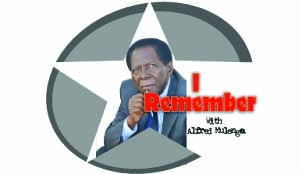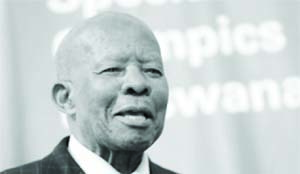WHEN Botswana’s independence hero and former president Kenneth Kaunda’s best friend Sir Seretse Khama died in July 1980, I was still in London as one of 10 the journalists from 10 Commonwealth member countries undertaking a special Harry Brittan Memorial Fellowship programme of studies and tours of Britain under the aegis of the Commonwealth Press Union (CPU).
The programme took us to various parts of the United Kingdom and some of the UK’s top universities, financial and media institutions, including, among others, the City University, London, Oxford University, Edinburg University, BBC, Daily Mirror Training School, Plymouth, Bank of England, London Stock Exchange, etc.
It was instructive and exceedingly memorable. But little did I realise at the end the programme I would end up not only working in Botswana but – believe it or not – doing so right from Sir Seretse Khama’s former offices in the Gaborone Main Mall -and his official residence, which by the time I joined the Botswana government’s Department of Information and Broadcasting Services in 1997 had been converted into Radio Botswana studios.
For the record, and for the benefit of the younger generation, when Sir Seretse died he was succeeded by his vice president and former minister of Finance and Development planning, Quett Masire.
At no time in my life did I ever imagine I would meet, face-to-face with Botswana’s second Republican president who confounded male chauvinists by appointing a woman, Gaositwe Chiepe, as his Foreign Affairs minister at a time when the battle against racism and apartheid in neighbouring South Africa was at its zenith.
So how did I find myself in Sir Ketumile’s spacious office at the Government Enclave where the new Office of the President (OP) is located?
However, before I explain what transpired, some background information would suffice.
I had arrived in Gaborone in 1992 to take up an appointment as editor of the Botswana Gazette, a private weekly co-owned by Clara Olsen, her husband Peter, local business executive Satar Dada of the Motor Centre fame and a few other Batswana investors.
Given the size of the paper coupled with manpower constraints, I was responsible for not only editing but also laying out the pages in consultation with the advertising executives, headed by former Times of Zambia’s advertising guru, Chase Mhango, who had also migrated to Botswana from Zimbabwe where he returned at the end his exile in Zambia in 1980 when the former Rhodesia won its independence from Britain.
As a stranger working in a foreign land, you do everything possible to avoid finding yourself on the wrong side of the law.
Despite your ideological orientation, you also do not want to be accused of ‘meddling’ in local politics no matter how strongly you may feel about certain domestic issues.
As a result, as I drove to work from Lentsweletau, a village some 35km west of Gaborone where my wife was teaching, I could sense that something ominous had happened because there was not a single copy of the Gazette newspaper on the streets that morning.
It was before 10 hours (the time when we often held our editorial (postmortem) meetings.
Has the paper been snapped up? I wondered as I parked my vehicle outside the company’s old offices at the African Mall in 1993.
When I was told what had happened, my heart simply sunk: Some ‘crazy man’ at Pretoria News in South Africa where the paper was sent for printing the previous night, had ‘messed up things for us’. What?
 On the front page, I had scaled in two pictures – one of President Masire (with a caption) at the top of the page – and the other one of a malnourished street kid foraging for food in a rubbish bin outside a fast food outlet in the Gaborone Central Business District – at the bottom of the page.
On the front page, I had scaled in two pictures – one of President Masire (with a caption) at the top of the page – and the other one of a malnourished street kid foraging for food in a rubbish bin outside a fast food outlet in the Gaborone Central Business District – at the bottom of the page.
This picture, too, had its self-contained caption, highlighting the plight of street children from disadvantaged families as one of Botswana’s growing social problems.
In those days desktop publishing technology, which enables the graphics artist or sub-editor to design pages on the computer, was not as widespread as it is today.
So we were required to send the paper to the printers across the border, camera-ready, with each picture illustrating the story clearly marked as to where it had to be slotted in on the page.
But what does the Pretoria News paste-up artist do?
He transposes the captions on the front page, depicting Masire as the ‘street kid’ scavenging for food’ from the dust bin; and the street kid, in torn clothes, as the president of Botswana.
What warped thinking, as former president Kenneth Kaunda (KK) would call it in those days.
“So we sent our drivers – Peter and Solomon – to go and withdraw all the copies of the papers from circulation when the monumental blunder was discovered early this morning.
Meantime, we have to go to the Office of the President and find a way to explain this whole thing and apologise to the President,” a distraught News Company of Botswana director Peter Olsen told me, as I stood there transfixed and wondering what would happen to ‘this foreigner from Zambia’.
I had heard of stories of many foreign journalists who had been deported from Botswana, for what sins, I do not know.
I believe they included Zambia’s renowned scribe and friend John Mukela whom I later found in Mozambique at the Nordic/SADC Journalism Centre in Maputo during an NSJC course managers’ workshop in 1995.
Clara Olsen, the managing editor, said to me: “You go, you are the editor. We simply have to apologise to President Masire; some of these people (racists) are not incapable of sabotage.”
The astute Clara, who had worked for the defunct Rand Daily Mail in Johannesburg, knew what she was talking about.
Above all, withdrawing the paper from circulation meant a huge loss in advertising and newspaper sales revenue.
So Mr Olsen and I drove to the Office of the President and say ‘sorry Sir for what has happened’, something I had never done in my own country. Not only that: Going to apologise not to the president of my country at State House in Lusaka, but to the president of Botswana?
It was a frightening and very unpredictable situation for me, to say the least.
What is the President going to tell me? Hand me over to the Chief Immigration officer for instant deportation? What would happen to my wife and children who were still in school? These were some of the questions racing in my mind as Mr Olsen and I waited to be ushered into the President’s air-conditioned and well-furnished office.
Finally, a presidential aide – I think it was Andrew Sisinyi, author and journalist, who was the Press secretary to the President, opened the door so that we could go in as the President was expecting us.
“This is it,” I muttered to myself and said a little silent prayer as the President of Botswana asked us to sit down. My friend it can be intimidating; it is not the same thing as sitting before a president of a football club or Rotary club. You are facing a man with the prerogative of mercy…..
Mr Olsen, who had worked for the Botswana government before, introduced me to the President.
After Mr Olsen had explained the nature of our business and much to relief, President Masire turned out to be such a saint.
Simply magnanimous!
Unknown to me at the time was the fact that Sir Ketumile Masire started his career as a journalist, writing and editing a local publication called Naledi (Setswana word for Star) before he entered active politics as secretary of the ruling Botswana Democratic Party in the 60s.
And having gone to school in South Africa he was familiar with the thinking and bigotry of a typical Afrikaner at the time.
Commenting on the issue at hand, President Masire calmed my nerves when he simply said, “I don’t blame you; it’s not your fault. I know the thinking there, somebody probably thinks I don’t deserve to be a president of a country. But it is not everyone who thinks like that, that’s for sure.”
And as if Pretoria News officials were listening, the following day they dispatched a senior management official, finance manager to Gaborone to come and apologise to News Company management and assuring that the man who had “caused everyone the embarrassment had been sacked”.
After that incident, the Botswana Gazette ceased to be printed in South Africa as a local printing and publishing company owned by one of the News Company shareholders would be doing the job at a reduced cost.
Management supported me all the way through and I was able to conclude my contract and left on my own volition to join the Department of Information and Broadcasting Services, Daily News and later the Botswana Press Agency (BOPA) in 1997 to 2006.
Because of office accommodation constraints, the Daily News and BOPA offices were in the former President Sir Seretse Khama’s office building located next to Debswana House and the Botswana Book Centre (BBC) and very close to the British and Nigerian High Commissions in the Gaborone Main Mall.
Radio Botswana (RB) studios were housed in the old State House behind the new South African High Commission on Queen’s Road.
All the departments, including Botswana Television (Btv) the latest arrival on the scene, have since relocated to the new Mass Media Complex; and I have been part of the massive transformation.
Comments: alfredmulenga777@gmail.com







